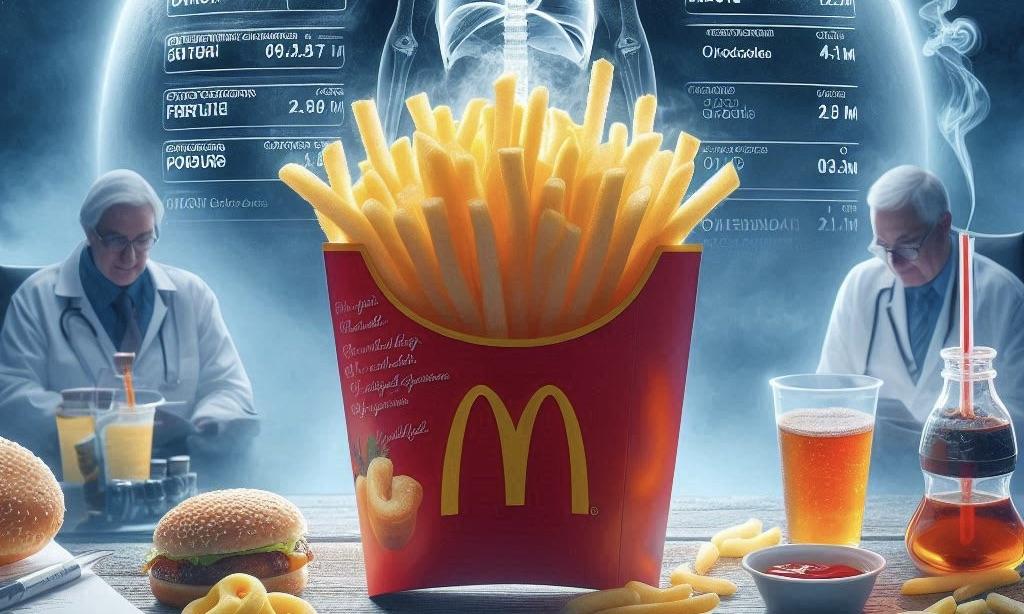Alarming claims have surfaced online suggesting that McDonald’s French fries—arguably one of the fast food chain’s most beloved menu items—may be linked to cancer. With millions of customers enjoying these crispy delights daily, the rumors have sparked widespread concern and left many wondering: Could something as simple as a serving of fries pose a serious health risk?
The controversy centers around the potential presence of acrylamide, a chemical compound that forms when certain starchy foods are cooked at high temperatures, such as frying or baking. Acrylamide has been classified as a potential carcinogen by several health organizations, leading to concerns that foods like French fries could contribute to an increased cancer risk.
The Science Behind Acrylamide and Cancer Risks
Acrylamide forms naturally when foods rich in carbohydrates, such as potatoes, are cooked at high temperatures—particularly through frying. The chemical compound was first discovered in foods in 2002, and studies have since explored whether long-term exposure to high levels of acrylamide could increase the risk of cancer.
According to experts, the concern is primarily based on laboratory studies, which have shown that acrylamide can cause cancer in animals when consumed in very high doses. However, the National Cancer Institute (NCI) clarifies that while these findings are troubling, the evidence linking acrylamide in food to cancer in humans remains inconclusive. The levels of acrylamide found in common foods like French fries are significantly lower than the amounts used in animal studies.
“While it’s true that acrylamide has been shown to cause cancer in animals, the doses used in those experiments were much higher than what people typically consume,” said Dr. Emily Larson, a nutrition and public health expert. “There’s no definitive evidence at this time that links moderate consumption of foods containing acrylamide, such as McDonald’s fries, to cancer in humans.”
McDonald’s Responds to the Claims
As concerns circulate, McDonald’s has not remained silent on the issue. In response to the controversy, the fast food giant reiterated its commitment to food safety and quality. “We follow stringent guidelines and cooking methods to ensure our food is safe for our customers,” a McDonald’s spokesperson said. “Our French fries are made with high-quality ingredients and prepared using industry standards to minimize acrylamide levels.”
The company has also made efforts to reduce acrylamide content by adjusting cooking temperatures and introducing new potato varieties with lower starch content, further addressing health concerns.
What Does This Mean for Customers?
While the potential link between French fries and cancer is concerning, experts agree that moderation is key. “The occasional serving of French fries is unlikely to pose a significant health risk,” Dr. Larson added. “However, it’s important to maintain a balanced diet and limit the intake of fried and processed foods to reduce overall health risks.”
For those who are still worried about acrylamide, simple steps can help reduce exposure. Opting for baked or boiled potatoes instead of fried, cooking at lower temperatures, and choosing whole foods over processed options can all contribute to a healthier lifestyle.
The Controversy Continues
While the science around acrylamide and cancer risks is still evolving, the claims surrounding McDonald’s French fries have certainly sparked a heated debate. For now, experts advise customers to enjoy their fries in moderation and stay informed as more research becomes available.
The question remains: Will these popular fries continue to be a guilty pleasure for millions, or will growing health concerns cause consumers to rethink their fast food choices? Only time will tell.



 6 simple questions to tell if a ‘finfluencer’ is more flash than cash
6 simple questions to tell if a ‘finfluencer’ is more flash than cash  AI is driving down the price of knowledge – universities have to rethink what they offer
AI is driving down the price of knowledge – universities have to rethink what they offer  Yes, government influences wages – but not just in the way you might think
Yes, government influences wages – but not just in the way you might think  Heritage, desire and diplomacy: why China still values scotch whisky
Heritage, desire and diplomacy: why China still values scotch whisky  The pandemic is still disrupting young people’s careers
The pandemic is still disrupting young people’s careers  Britain has almost 1 million young people not in work or education – here’s what evidence shows can change that
Britain has almost 1 million young people not in work or education – here’s what evidence shows can change that  Parents abused by their children often suffer in silence – specialist therapy is helping them find a voice
Parents abused by their children often suffer in silence – specialist therapy is helping them find a voice  Every generation thinks they had it the toughest, but for Gen Z, they’re probably right
Every generation thinks they had it the toughest, but for Gen Z, they’re probably right  Can your cat recognise you by scent? New study shows it’s likely
Can your cat recognise you by scent? New study shows it’s likely  The American mass exodus to Canada amid Trump 2.0 has yet to materialize
The American mass exodus to Canada amid Trump 2.0 has yet to materialize  Why have so few atrocities ever been recognised as genocide?
Why have so few atrocities ever been recognised as genocide?  How to support someone who is grieving: five research-backed strategies
How to support someone who is grieving: five research-backed strategies  Columbia Student Mahmoud Khalil Fights Arrest as Deportation Case Moves to New Jersey
Columbia Student Mahmoud Khalil Fights Arrest as Deportation Case Moves to New Jersey  Stuck in a creativity slump at work? Here are some surprising ways to get your spark back
Stuck in a creativity slump at work? Here are some surprising ways to get your spark back 































